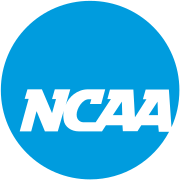
Back Campeonato de la División I de Fútbol Americano de la NCAA Spanish NCAA-yliopistojalkapallon I-divisioonan Bowl-sarja Finnish Championnat NCAA de football américain French Campionato universitario statunitense NCAA di football americano - Division I FBS Italian NCAA Football Portuguese College football national championships in NCAA Division I FBS SIMPLE
| Current season, competition or edition: | |
 | |
| Sport | American football |
|---|---|
| Founded | 1869 |
| First season | 1869 |
| Organizing body | CFP Administration, LLC[1] |
| Country | United States |
| Most recent champion(s) | Michigan (2023) |
| Most titles | Princeton (28 titles) |
| Level on pyramid | 1 |
| Related competitions | Division I (FCS) |
| Official website | ncaa.com/football/fbs |
| Championships |
|---|
|
A national championship in the highest level of college football in the United States, currently the NCAA Division I Football Bowl Subdivision (FBS), is a designation awarded annually by various organizations to their selection of the best college football team. Division I FBS football is the only National Collegiate Athletic Association (NCAA) sport for which the NCAA does not host a yearly championship event. As such, it is sometimes referred to as a "mythical national championship".[2][3][4][5][6]
Due to the lack of an official NCAA title, determining the nation's top college football team has often engendered controversy.[7] A championship team is independently declared by multiple individuals and organizations, often referred to as "selectors".[8] These choices are not always unanimous.[7] In 1969 even the President of the United States, Richard Nixon, made a selection by announcing, ahead of the season-ending "game of the century" between No. 1 Texas and No. 2 (AP) Arkansas, that the winner would receive a presidential plaque commemorating them as national champions despite the fact that Texas and Arkansas still had to play in a bowl game afterward.[9] Texas went on to win, 15–14.[9]
While the NCAA has never officially endorsed a championship team, it has documented the choices of some selectors in its official NCAA Football Bowl Subdivision Records publication.[8][10] In addition, various analysts have independently published their own choices for each season. These opinions can often diverge with others as well as individual schools' claims to national titles, which may or may not correlate to the selections published elsewhere. Historically, the two most widely recognized national championship selectors are the Associated Press (AP), which conducts a poll of sportswriters, and the Coaches Poll, a survey of active members of the American Football Coaches Association (AFCA).[11][12][6]
Since 1992, various consortia of major bowl games have aimed to invite the top two teams at the end of the regular season (as determined by internal rankings, or aggregates of the major polls and other statistics) to compete in what is intended to be the de facto national championship game. The current iteration of this practice, the College Football Playoff, selects twelve teams to participate in a national first round or quarterfinals, with the final four teams advancing to the semifinals. The games of the quarterfinals and semifinals are hosted by all of the six partner bowl games, with the final two remaining teams advancing to the College Football Playoff National Championship.
- ^ "Frequently Asked Questions about the CFP". Archived from the original on October 1, 2024. Retrieved October 27, 2024.
The College Football Playoff is administered by the FBS conferences and the University of Notre Dame which are members of CFP Administration, LLC.
- ^ "Syracuse and Cornell Still Top Gridders". The Reading Eagle. Reading, Pennsylvania. November 12, 1923. p. 12. Archived from the original on November 17, 2015. Retrieved May 5, 2015.
- ^ Viehman, Harold H., ed. (1939). The 1939 Owl. Pittsburgh: University of Pittsburgh. p. 276. Archived from the original on April 4, 2012. Retrieved May 5, 2015.
- ^ Dodd, Dennis (December 22, 2004). "Subtracting AP poll leaves BCS again scrambling for legitimacy". CBS Sports. Archived from the original on March 8, 2013. Retrieved May 5, 2015.
- ^ Peterson, Bill (November 5, 2008). "UC Football in the Hunt for a Big East Crown and BCS Bid". Citybeat.com. Archived from the original on June 9, 2015. Retrieved May 5, 2015.
- ^ a b Cite error: The named reference
NCAA1960was invoked but never defined (see the help page). - ^ a b Hooper, Matt (October 10, 2009). Noel, Tex (ed.). "How many national titles can Alabama really lay claim to? Better yet, why is there more than one answer? (republished with permission from the Birmingham Weekly)" (PDF). The College Football Historian. 2 (9). Intercollegiate Football Researchers Association. ISSN 2326-3628. Archived (PDF) from the original on September 24, 2015. Retrieved May 5, 2015.
- ^ a b Cite error: The named reference
NCAA_2022_Major_Selectorswas invoked but never defined (see the help page). - ^ a b Weinreb, Michael (June 18, 2013). "Tricky Dick's Trick Play". Grantland. Archived from the original on July 2, 2016. Retrieved January 8, 2017.
In 1969, President Nixon was the decider of the national championship
{{cite web}}: More than one of|work=and|website=specified (help) - ^ Cite error: The named reference
NCAA_2022_Final_National_Poll_Leaderswas invoked but never defined (see the help page). - ^ Blevins, Dave (2012). College Football Awards: All National and Conference Winners Through 2010. p. 73.
the two most widely recognized and authoritative [national championship] selectors are the Associated Press (which conducts a poll of football sportswriters) and the USA Today Coaches' Poll of the American Football Coaches Association.
- ^ Benagh, Jim (October 6, 1985). "Top Spot in Poll Draws Reward". The New York Times. Archived from the original on August 15, 2022. Retrieved August 14, 2022.
When the University of Iowa rose to No. 1 in The Associated Press and the United Press International college football rankings last week, it was reason for elation across the state. ... The polls, since the first one began 50 years ago this month, have been the prime measuring stick for determining the champion, albeit an unofficial one.